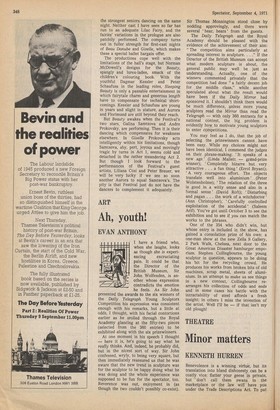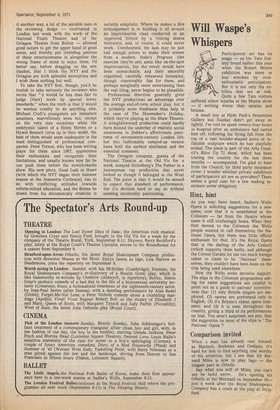Minor matters
KENNETH HURREN
Benevolence is a winning virtue, but its translation into bland dishonesty can be a costly vice: flatter your geese in private, but "don't call them swans in the marketplace or the law will have you under the Trade Descriptions Act. To put
it another way, a lot of the amiable men in the reviewing dodge — confronted in London last week with the work of the National Youth Theatre and of the Octagon Theatre from Bolton — allowed good nature to get the upper hand of good sense, and thereby put intending patrons of these entertainments in altogether the wrong frame of mind to enjoy them. I'd better say, before dragging on the wet blanket, that I think the NYT and the Octagon are both splendid enterprises and I wish them nothing but well.
To take the NYT first, though, you'd be foolish to take seriously the reviewer who wrote that "it would be less than fair to judge /their] work by special lower standards," when the truth is that it would be wanton cruelty to do anything else. Michael Croft's youngsters are immature amateurs, marvellously keen but, except on the very rare occasions when the embryonic talent of a Helen Mirren or a Hywel Bennett turns up in their midst, the best of them would seem inadequate in the least distinguished of professional companies. Peter Terson, who has been writing plays for them since 1967, appreciates their enthusiams and recognizes their limitations, and usually knows how far he can push them before the stretch-marks show. His new piece, Good Lads at Heart (with which the NYT began their summer season at the Jeannetta Cochrane), has to do with conflicting attitudes towards reform-school education, and the drama he draws from his documentary situation is suitably simplistic. Where he makes a dire misjudgement is in building it all around an improvisation class conducted at an Approved School by a visiting drama instructor, and, of course, it could never work. Unrehearsed, the lads may be just bad enough actors to make their scenes from a modern Rake's Progress (the exercise they're set) seem like on-the-spot improvisation, but the 'result would have been unwatchable; and their smoothly organized, carefully rehearsed horseplay, though conceivably fun for them, and perhaps marginally more entertaining than the real thing, never begins to be plausible.
Professional direction generally gives the NYT productions an advantage over the average end-of-term school play, but it it probably more hindrance than help in the case of The Shoemaker's Holiday, which they're playing at the Shaw Theatre. A straightforward production could hardly have missed the underlay of realistic social awareness in Dekker's affectionate panorama of seventeenth-century London life; but this fashionably camped-up version loses both the surface ebullience and the essential comment.
The Octagon company, guests of the National Theatre at the Old Vic for a week, essayed Strindberg's The Father in a journeyman rep production that never looked as though it belonged in the West End. The point is that it would be absurd to expect that standard of performance, but it's devilish hard to say so without seeming intolerably patronizing.



































 Previous page
Previous page